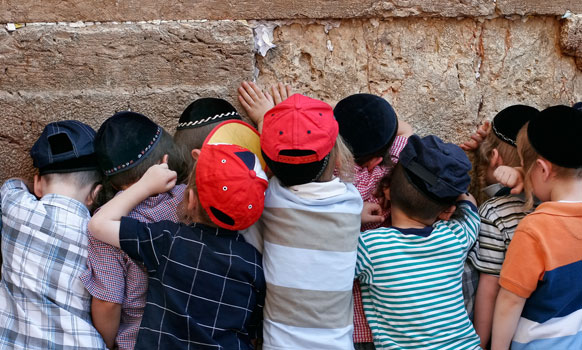
How We Can Love Other Jews and End Our Exile
This time of year, we love to talk about hate.
We love to quote the Talmudic passage (Yoma 9b) that says the Second Temple was destroyed because of sinat chinam, usually translated as baseless hatred; we love to talk about increasing ahavat chinam, baseless love, to end the exile that hated began. And we love to tell the story of Kamtza and Bar Kamtza, which the Talmud elsewhere (Gittin 55b) mentions more specifically as the cause of Jerusalem’s destruction.
These are excellent and important themes. But there’s a problem with that story of the confusing names as we often tell it: The fuller story the Gemara shares, to explain its statement (in the name of a Rabbi Yochanan) that “Jerusalem was destroyed because of Kamtza and Bar Kamtza,” makes it clear that “cause” is more complicated than any such pithy statement might lead us to believe.
A summary for the uninitiated (or reminder for the initiated):
There was once a man who lived in Jerusalem, who had a friend named Kamtza and an enemy named Bar Kamtza. The man is not named, but we’ll call him Bill. Bill made a party, and unsurprisingly given the similarity of the names, the invitation meant for Kamtza was mistakenly delivered to Bar Kamtza. (Some commentaries suggest the two were father and son, which might help explain both the names and the mix-up.) Bill was displeased to find Bar Kamtza at his party and told him to leave. Bar Kamtza, presumably wishing to avoid the embarrassment of being kicked out in the middle of an event, pleaded to be allowed to stay and finish eating, even offering first to pay for his meal, then for half the party, then even the whole party. Bill refused all offers, and eventually removed him bodily from the premises.
Bar Kamtza, in turn, was displeased with his treatment – and more to the point, with the silence of community leaders who were present. “Since the rabbis were sitting and didn’t protest, they must be okay with it. I’ll go and inform on them to the king.” He went to the Roman authorities and claimed the Jews were planning a rebellion.
That’s where we often end the story, as if his slander led the Romans to immediately attack Jerusalem and destroy the Temple. Even if it were that simple (it’s not), we would have questions about blame: Why attribute the destruction to “Kamtza and Bar Kamtza,” when it seems the really blameworthy behavior lies with Bar Kamtza and Bill? What did Kamtza do wrong, to be named as part of the cause of catastrophe? (Commentaries speculate, for instance, about whether he might himself have attended the party, even without his invitation, or not – and how his presence or absence might have contributed to the escalation.) And even within the interactions between Bar Kamtza and Bill, which element of “hatred” is to blame, anyway? Was the enmity between Bar Kamtza and Bill, that started it all, chinam (baseless) or was there good reason? Should Bill have allowed Bar Kamtza to stay; if he had, could the destruction have been averted? Should Bar Kamtza have left immediately when asked, or perhaps even realized there must be a mistake and not shown up in the first place? (Possibly he thought the invitation was an attempt to reconcile, but once Bill indicated it wasn’t, was Bar Kamtza’s refusal to leave the real impetus for the chain of events leading to the exile?) And of course, it seems like Bar Kamtza has a good point; why did no one speak up in his favor? Shouldn’t we attribute some blame not just to “Kamtza and Bar Kamtza” but to the entire community, or at least the leadership, for allowing such hatred and ill-treatment to go unprotested?
(Some commentaries try to explain why, indeed, the leaders didn’t speak up – for instance, perhaps they thought Bill had good reason to remove Bar Kamtza, whose slander, and further bad behavior as we’ll see, may have revealed the true colors Bill saw all along. Alternatively, perhaps they felt powerless, despite their theoretical communal standing. Important discussions, but not our current focus.)
Of course, we might simply wash away all those nitpicky questions by saying the Gemara doesn’t mean “because of the two individuals named Kamtza and Bar Kamtza,” but “because of a complex sequence of events that involved several interpersonal infractions, which we will title Kamtza and Bar Kamtza because it’s catchy.”
On the other hand, there’s even more to the story, including another pithy statement of blame that’s even harder to understand.
Ironically, it’s the Romans – the most obvious villains of the story of the Temple’s destruction – who demonstrate the coolest, fairest heads. Bar Kamtza reports that the Jews are planning to rebel, but the emperor, quite reasonably, is unwilling to simply take his word for it. (“Who says?!” is the precise ancient wording reported in the Talmud.) Bar Kamtza then proposes a test of Jewish loyalty to their Roman overlords: “Send an animal to sacrifice, and see if they sacrifice it.” In a moment of less savvy people-judgment, the emperor sends his donation in the care of the disgruntled Bar Kamtza – who sneakily makes a cut on the animal that invalidates it for the Jewish Temple’s rules but would seem so innocuous to the Romans that the Jewish authorities couldn’t possibly explain their refusal to offer the sacrifice.
The Jewish leaders are now in a terrible position. Violate the rules of the Holy Temple by offering this blemished animal on its altar, or offend the powerful Roman authorities by refusing? Most leaned towards sacrificing the animal, as they believed this particular infraction was acceptable for the sake of maintaining peace with the government. A certain Rabbi Zecharia, however, expressed concern that sacrificing the animal would set an unacceptable precedent: people would think blemished animals could be brought on the holy altar! The next solution entertained – somewhat shockingly – was to silence the guy who would tell the emperor they’d refused to sacrifice his gift. (I imagine the reason they could consider killing Bar Kamtza is that they saw it as a case of self-defense – but that’s a separate topic.) This, too, Rabbi Zecharia protested – not because it wouldn’t be a just killing, but because “people will think one who makes a blemish on an animal designated as a sacrifice is liable for the death penalty!”
The Talmud ends that portion of the tale there, but it seems they did nothing and Bar Kamtza’s slander was accepted – leading to the beginning of a Roman campaign against the Jews, described starting two lines later in the Talmud, that ultimately led to the Temple being destroyed.
In the line in between, though, Rabbi Yochanan closes the bookends on this chapter of the story by asserting that “The humility of Rabbi Zecharia destroyed our Temple and burned our sanctuary and exiled us from our land.”
Apparently, it wasn’t actually the fault of Kamtza, or Bill, or the silent sages, or even Bar Kamtza; it wasn’t even the Romans’ fault! Rather, it was Rabbi Zecharia who caused all that catastrophe. More specifically, it was his humility!
Without getting into all the deeper explanations scholars have suggested for this whole debate (and there are many), I find it striking that Rabbi Yochanan attributes Rabbi Zecharia’s role, and blame, to “humility” – a trait we tend to think of as positive.
Maybe it’s not that Rabbi Zecharia did anything wrong. And maybe we can’t simply lay the blame for the entire sequence of events at any one person’s doorstep: not Kamtza, who may have been an innocent party to the whole initial conflict; not Bar Kamtza, who was just one slighted person; not even the Romans, who the Talmud here implies wouldn’t have acted against the Jews if they hadn’t been given cause to believe the Jews were the bad guys. Maybe our attempts to distill the cause of any event down to one person or act will only lead us to the inescapable conclusion that even the good guys – the humble guys, who speak out to prevent killing, who are even right to do so – might contribute to a sequence of events that leads to terrible catastrophes.
That doesn’t mean the good guys aren’t good; as I saw one commentary point out (Daf al Daf), even in the immediate aftermath of the catastrophe attributable to Rabbi Zecharia’s “humility,” humility was venerated as an ideal trait (Ethics of our Fathers 4:4).
And as the Chatam Sofer points out, the Talmud isn’t necessarily faulting Rabbi Zecharia for his role, even if he did cause all those terrible things to happen. After all, how could he have guessed such a small matter would lead to such disaster? Rather, the point is that we must learn from his experience: he didn’t know what could result, but we’ve seen it, and must take that into account, along with all the rest that history has to teach us, when we make our own future decisions.
History, after all, has much to teach us – about the complexity of cause and effect, and how blame for most wrongs tends to be shared among multiple individuals and circumstances, sometimes even individuals with the best of intentions.
If we can appreciate that message from the extended story of “Kamtza and Bar Kamtza and Bill and the Romans and Rabbi Zecharia and all the rest,” maybe we can be more careful in our own decisions, including being kinder in our judgments of others.
And maybe that’s how we can decrease sinat chinam and replace it with the ahavat chinam we need to end our exile.
If you found this content meaningful and want to help further our mission through our Keter, Makom, and Tikun branches, please consider becoming a Change Maker today.







